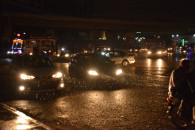What has changed?
The scars of war in Iran and Iraq, Lebanon and Mozambique are not just scars, they are wounds that still pain

The writer is a Howard Hughes Medical Institute professor of biomedical engineering, international health and medicine at Boston University. He tweets @mhzaman
Whether the warring factions are two neighbouring countries that share a border, or two neighbours who share a wall, as was the case in Lebanon for fifteen years, there are no winners. Every time I walk past the Holiday Inn in Beirut, not far from the American University, I am reminded not of the days when the hotel was full with tourists, but of the days when everything was lost: life and the reason to live for so many. The scars of war, in Iran and Iraq, Lebanon and Mozambique, are not just scars, they are wounds that continue to cause pain, suffering and agony and even affect those who were born well after the leaders of the warring factions shook hands over a document and told everyone to forget the past decade.
The jingoist dance choreographed with the drums of war may fill the heart with momentary pride, but it does not solve any real problems that society faces. Between last week and this one, our economic and social challenges remain the same. The water crisis remains real and does not get addressed by the honourable minister of water dancing atop the crashed jet. The malnourished still seek clean water and nutrition — something no amount of ammunition can provide.
Yet, there is also a silver lining, albeit one that may get shadowed soon by the same clouds that cover most of our daily existence. The silver lining is not that we have seen that our favourite film heroes, athletes or “objective” journalists — who we tend to put on the pedestal of infallibility and ultimate grace — are in fact fallible and highly prone to aggressive impulses. We should have known that long time ago.
The silver lining is about the power of dignity and decency.
The message is that what resonates with people is not a vindictive stance, but the respect for life, the dignity of our behaviour and our unwavering commitment for the rule of law. The ability to bring people together, even those who may be adversaries, rests not in having a shouting match atop a container, or making cheap personal shots on primetime TV, or sending a nasty tweet that are unbecoming of the office of a minister or a parliamentarian, but in standing up for human dignity and decency. The real challenge now lies in seeing whether the emphasis on not giving to our worst impulses, and not being vindictive, in words or action, can drive our development agenda in solving our most pressing problems for those who need development the most. The real test is going to be standing up for those who may be weak and abiding by laws in dealing with those who speak up and question our decisions. The silver lining is that we now know that acting with dignity is well within reach, but is that an accidental spark or a harbinger of a lasting spring?
Published in The Express Tribune, March 5th, 2019.
Like Opinion & Editorial on Facebook, follow @ETOpEd on Twitter to receive all updates on all our daily pieces.














COMMENTS
Comments are moderated and generally will be posted if they are on-topic and not abusive.
For more information, please see our Comments FAQ